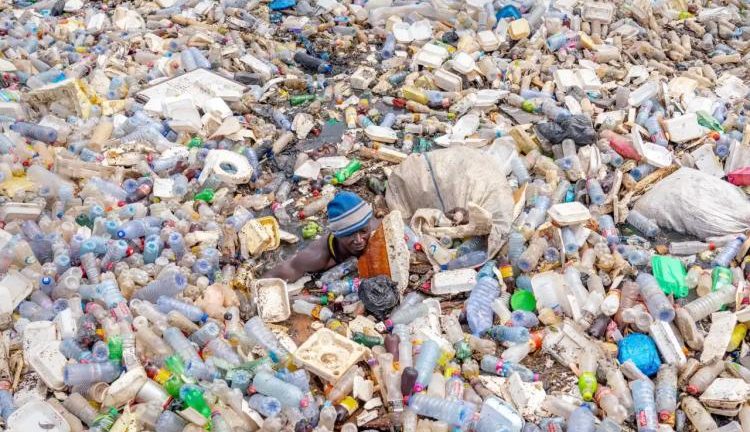By Lisa Vives, Global Information Network
NEW YORK | 26 February 2024 (IDN) — Environmentalists are worried. Plastics, tons of it, are being produced annually, but 70 percent of it ends up in landfills or is incinerated.
Several studies have predicted that by the middle of the 21st century, there will be more plastic than fish in the world’s oceans.
In Ghana, some of the effects of ocean pollution are already being seen as fisher folks are catching more plastic than fish.
“For some years now, whenever we cast our nets, all we catch are plastics,” said Kwame Nkum, a Ghanaian who claims to know about the problem firsthand. “Sometimes, after a whole haul, you only get a dozen fishes, and the rest is just waste.”
Of Ghana’s total plastic waste, an estimated 86 percent is improperly disposed of, resulting in plastics clogging up stormwater drains, rivers, and streams and ending up in the oceans.
With such a huge plastic waste problem, Ghana has an overall Ocean Health Index score of 65 out of 100, which is said to be lower than the global average score of 69. The country is ranked 160 out of 220 regions on the index.
All this plastic waste poses a dire threat to Ghana’s fishing industry, which employs 200,000 fishers, delivering 80 percent of the total fish supply locally and providing a livelihood to over 2 million people, including thousands of market women.
While several other African countries have adopted punitive legislative anti-plastic bans targeting the importation, production, and consumption of single use plastics, Ghana has been slow to tackle plastics.
New tools to increase plastic waste collection and recycling are being developed along the lines of carbon credits—collectively called “plastic credits”.
With these tools, the World Bank has just announced a $100M waste reduction bond for plastic and carbon credits. This innovative bond provides investors with a financial return linked to Plastic Waste Collection Credits, Plastic Waste Recycling Credits (collectively, plastic credits), and Verified Carbon Units (carbon credits).
In addition to reducing plastic pollution, these bonds will address local pollution and air quality, reduce associated health impacts, and create jobs in often overlooked and marginalized communities.
Alexander Onica of Skandia, a Swedish financial services corporation, commented: “We are very pleased to participate in the Plastic Waste Reduction-Linked Bond. It’s a very good example of how investment capital can both generate a good return for our customers and at the same time contribute to solving some of today’s global challenges.
“The large amount of plastic that pollutes the world’s oceans are everyone’s responsibility,” said Onica.. “I’m pleased that Skandia is participating and contributing to part of the solution.”
Elsewhere, Kenya and Rwanda continue to break records in recycling plastic waste.
This week, a group of Kenyan women could be seen picking up plastic waste that will serve to build freezers. The waste is sold to Kuza Freezer, where employees break down the plastics into pellets before molding them into cold storage units.
Rwanda has been carrying out national bans to reduce the consumption and manufacturing of single use plastics since 2004. Rwanda was the first country in the African region to introduce a law banning plastic and is now recognized as one of the few countries in the world to react to the issue of plastic pollution progressively. [IDN-InDepthNews]
Photo: A man in plastic waste. Source: The Sun, UK
IDN is the flagship agency of the Non-profit International Press Syndicate.


